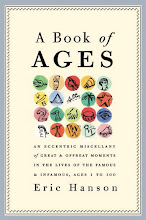I read in the paper this morning about a new Ben Franklin exhibit at the Minnesota History Center. Who better to spend an hour or two with over Thanksgiving? (Remember it was Franklin who wanted the turkey to be our national emblem, rather than the ill-behaved bald eagle.)
As I was collecting anecdotes and episodes for A Book of Ages, Franklin was the hardest to keep under control: there were so many stories, and so many begged for elaboration. But B. of A. is an ensemble piece. Each story is told at the right length for retelling in one elevator ride. Franklin appears 13 times, the same number as Freud, three fewer than Einstein, one more than Nixon.
At a dinner table ringed with personalities (which is how the book reads) Franklin is the most surprising, the most voluble. The kite is there (did he actually fly it in a thunderstorm?), the illegitimate son, the meeting with Voltaire in Paris (which many consider the high moment of the Enlightenment), his comment about the first manned flight (asked what good it was, he answered "What good is a newborn baby?"), as well as everyday matters of life and age: his retirement fund, his gout. Also his inventions: bifocals, the fire department, etc. Does anyone remember that Franklin was America's first best-selling author? On that score alone he'd have been an interesting person to know.
One item I edited out of the book (I had to edit out some things): it was Ben Franklin who brought rhubarb to America, in 1772.
Tuesday, November 24, 2009
Ben Franklin, the ideal dinner guest
Labels:
anecdote,
Benjamin Franklin,
dinner table,
Einstein,
founding fathers,
Freud,
museum,
Nixon,
the Enlightenment
Subscribe to:
Post Comments (Atom)





No comments:
Post a Comment